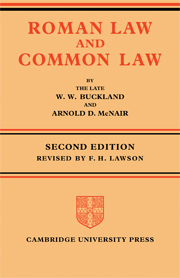Book contents
- Frontmatter
- Contents
- Preface
- Preface to the Second Edition
- Note on the 1965 Impression
- Introduction
- Abbreviations
- Chapter I THE SOURCES
- Chapter II THE LAW OF PERSONS
- Chapter III LAW OF PROPERTY
- Chapter IV LIMITED INTERESTS AND SERVITUDES
- Chapter V UNIVERSAL SUCCESSION
- Chapter VI OBLIGATIONS: GENERAL
- Chapter VII OBLIGATIONS: GENERAL (cont.)
- Chapter VIII PARTICULAR CONTRACTS
- Chapter IX QUASI-CONTRACT AND NEGOTIORUM GESTIO
- Chapter X DELICT AND TORT
- Chapter XI PARTICULAR DELICTS AND TORTS
- Chapter XII PROCEDURE
- Index
Chapter IX - QUASI-CONTRACT AND NEGOTIORUM GESTIO
Published online by Cambridge University Press: 30 March 2010
- Frontmatter
- Contents
- Preface
- Preface to the Second Edition
- Note on the 1965 Impression
- Introduction
- Abbreviations
- Chapter I THE SOURCES
- Chapter II THE LAW OF PERSONS
- Chapter III LAW OF PROPERTY
- Chapter IV LIMITED INTERESTS AND SERVITUDES
- Chapter V UNIVERSAL SUCCESSION
- Chapter VI OBLIGATIONS: GENERAL
- Chapter VII OBLIGATIONS: GENERAL (cont.)
- Chapter VIII PARTICULAR CONTRACTS
- Chapter IX QUASI-CONTRACT AND NEGOTIORUM GESTIO
- Chapter X DELICT AND TORT
- Chapter XI PARTICULAR DELICTS AND TORTS
- Chapter XII PROCEDURE
- Index
Summary
At some time in the Empire, probably rather late, an apparently heterogeneous group of civil obligations, themselves much older, acquired the name of obligatio quasi ex contractu. This name we have borrowed, though rather in treatises on law than in actual practice, and applied to a similar but far from identical group. No one has succeeded in isolating a positive common element of all these cases to serve for a definition, either for the Roman law or for ours. The definition formulated by Sir Percy Winfield, is negative: it denotes ‘liability, not exclusively referable to any other head of the law, imposed upon a particular person to pay money to another particular person on the ground of unjust benefit’. As he shows, the name is unsuitable. The implied promise which plays so great a part in our rules, and may historically account for the name, is often in flagrant contradiction with the facts; any real analogy with what we ordinarily call contract, an obligation essentially based on consent, is often not to be found. In Roman law the association of these cases with the notion of contract is perhaps historically better justified. We are accustomed to think of contract as actionable agreement, but there is evidence that for some at least of the lawyers of the early Empire it was not so limited. The word was not then common, but it was sometimes applied to anything which could be called a negotium, at least a civil negotium.
- Type
- Chapter
- Information
- Roman Law and Common LawA Comparison in Outline, pp. 329 - 337Publisher: Cambridge University PressPrint publication year: 1952



